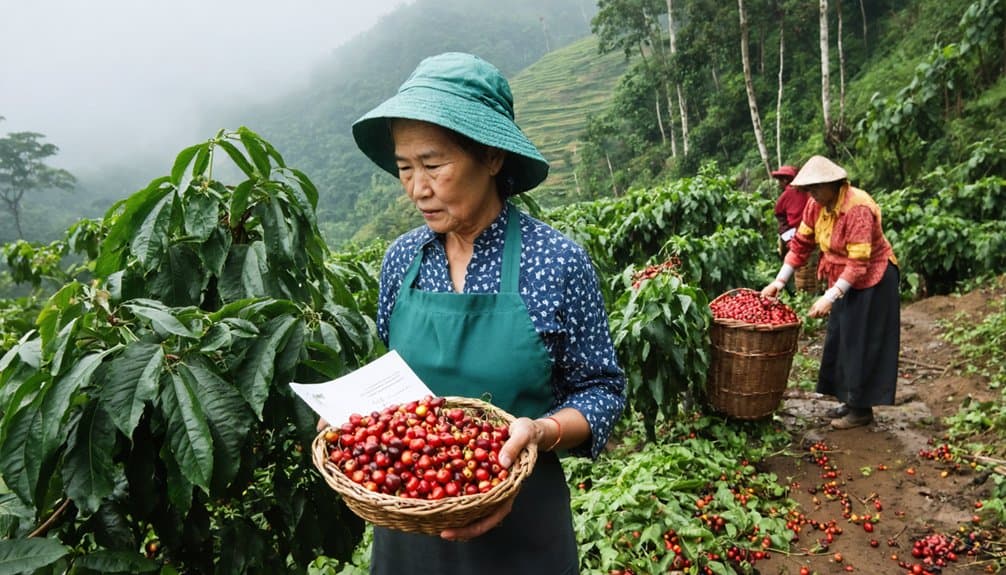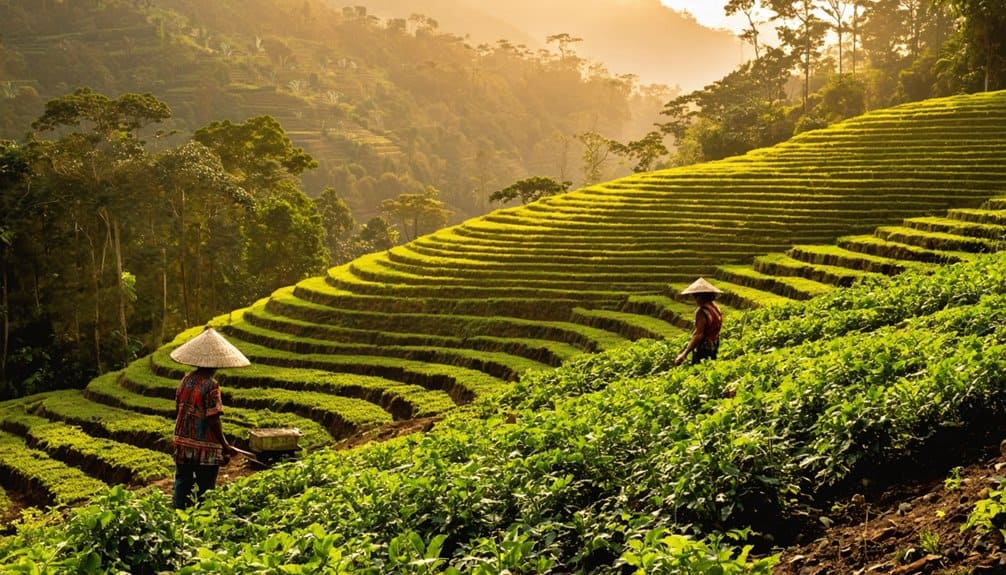You’ll find three key community practices making coffee sustainable: fair trade partnerships that guarantee farmers earn livable wages while increasing production capacity by up to 300%, education programs that equip communities with crucial skills from farming to roasting, and environmental initiatives that implement conservation methods like agroforestry and water management.
These interconnected approaches create resilient coffee ecosystems where both communities and nature thrive – and there’s much more to uncover about each practice.
Key Takeaways
- Fair trade certification ensures farmers receive sustainable income and generates premiums for community development projects.
- Community partnerships implement agroforestry and sustainable water management practices to protect coffee crops and local resources.
- Education programs empower farmers with sustainable farming techniques and business skills through authorized training centers.
- Women’s empowerment initiatives strengthen local economies and promote gender equality in coffee-producing communities.
- Collaborative reforestation projects and biodiversity preservation efforts create climate-resilient coffee farming systems.
Supporting Local Coffee Farmers Through Fair Trade

The fair trade coffee movement represents a powerful solution to address economic inequality in coffee-producing regions while promoting environmental sustainability.
When you choose fair trade coffee, you’re ensuring farmers receive at least $1.80 per pound for Arabica and $1.20 for Robusta, protecting them from market volatility.
This support is crucial since 25 million smallholders produce 80% of the world’s coffee supply.
The impact is significant – Ethiopian farmers who switched to fair trade saw their income surge by 250% and production capacity increase by 300%.
You’re also supporting gender equality and community development through the Fairtrade Premium, which generated €76.6 million in 2018 for farmer services and local projects.
Building Strong Coffee Communities With Education
Beyond fair trade pricing, education stands as a cornerstone of sustainable coffee communities worldwide.
Through the SCA Coffee Skills Program, you’ll find extensive training that covers everything from basic barista skills to advanced roasting techniques.
You’re part of a global movement that’s transforming coffee communities through knowledge and skill development.
The program’s authorized SCA Trainers ensure consistent quality education across all regions and skill levels.
When you pursue coffee education, you’re supporting a system that empowers farmers with sustainable practices and improved productivity.
The modular learning approach lets you start anywhere and progress toward recognized certifications, while multilingual accessibility guarantees everyone can participate in building stronger coffee communities through education.
Environmental Conservation Through Community Partnerships

While coffee production faces mounting environmental challenges, transformative community partnerships are leading the charge in conservation efforts.
You’ll find local leaders working with organizations to implement agroforestry practices, sustainable water management, and organic fertilization methods that protect both crops and ecosystems.
Nearly 20 percent of the world’s coffee smallholders are driving change through community initiatives in Mexico, Guatemala, Honduras, and Uganda.
Through these partnerships, you’re part of a movement that’s strengthening climate resilience. Community-led initiatives are driving reforestation projects, preserving biodiversity, and developing climate-resistant coffee varieties.
When you support these collaborative efforts, you’re helping empower farmers to manage their land sustainably while securing coffee’s future through research-backed conservation practices.
FAQs
How Can Small Coffee Shops Compete With Large Chains in Sustainable Practices?
You’ll stand out by partnering with local farms, implementing waste reduction programs, offering reusable cup incentives, and engaging your community through sustainability events that larger chains can’t easily replicate.
What Percentage of Coffee Price Typically Reaches Farmers in Fair Trade Arrangements?
You’ll find that farmers receive about 1% of retail coffee prices in fair trade arrangements, roughly $0.04 of your $4 specialty coffee, though Fairtrade’s minimum price guarantees better stability.
How Long Does It Take to See Measurable Impacts From Sustainability Initiatives?
You’ll see initial sustainability impacts within 1-3 years, like reduced chemical use and water conservation. Medium-term benefits emerge in 5-10 years, while full ecological transformation takes 10-20 years to achieve.
Which Coffee-Growing Regions Have the Most Successful Community Development Programs?
You’ll find the most impactful community development programs in Vietnam’s Son La Province, Tanzania’s Coffee Kids initiative, and Brazil’s Minas Gerais region, where fair trade practices and youth empowerment drive lasting change.
What Role Do Government Policies Play in Promoting Sustainable Coffee Practices?
You can bet your bottom dollar that government policies drive sustainable coffee through funding, regulations, farmer education, and market access, ensuring both environmental protection and economic growth.
The Bottom Line
You’ll find that sustainable coffee practices thrive when communities work together.
By supporting fair trade programs, investing in education, and partnering on conservation efforts, you’re creating lasting change.
Take Guatemala’s Sierra Madre coffee cooperative, where farmers have increased crop yields by 40% while protecting local watersheds through shared knowledge and resources.
Your daily coffee choice can help build these sustainable networks from bean to cup.